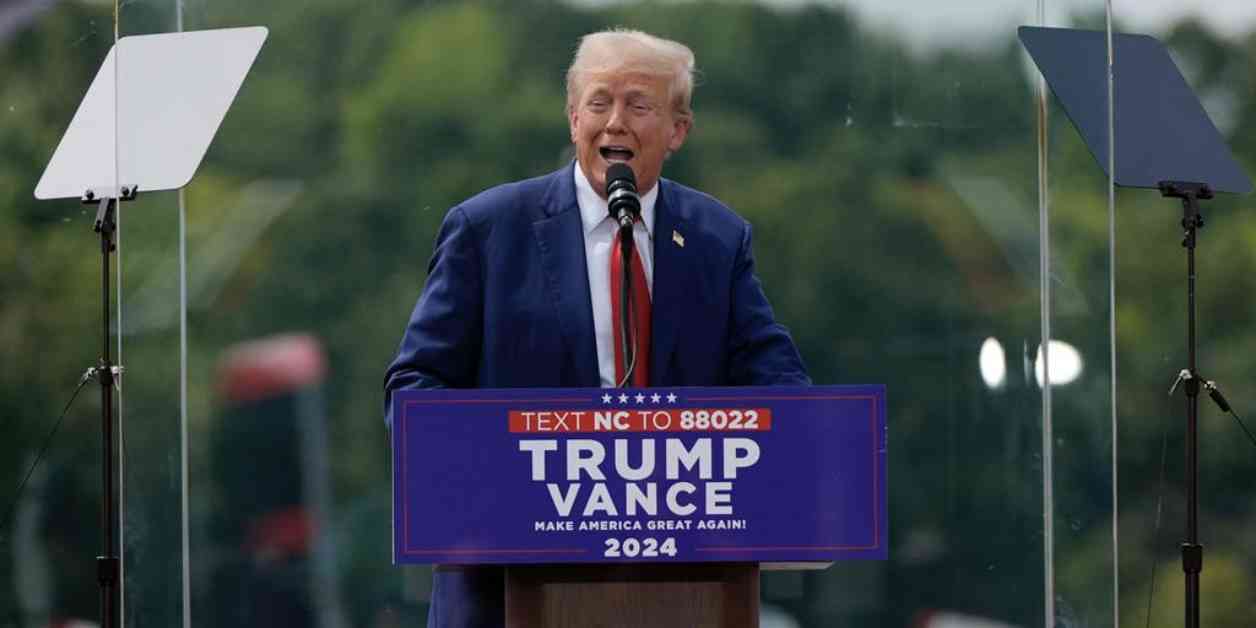Former President Trump is pointing to personal attacks at the Democratic National Convention (DNC) in Chicago by former President Obama and former first lady Michelle Obama as justification to disregard advice from allies to cut out insults and stick to policy attacks on Vice President Kamala Harris. During a rally in battleground North Carolina, Trump criticized the Obamas for their remarks at the DNC, where they took aim at his leadership and character.
Former first lady Michelle Obama emphasized during her address at the DNC that “going small is petty, it’s unhealthy, and, quite frankly, it’s unpresidential.” She further argued that Trump’s approach is “doubling down on ugly, misogynistic, racist lies as a substitute for real ideas and solutions that will actually make people’s lives better.” Former President Obama also chimed in, calling Trump a “78-year-old billionaire who has not stopped whining about his problems since he rode down his golden escalator nine years ago.”
Trump, spotlighting the verbal attacks on him from the previous night, seemed to mock advice from Republican allies who have urged him to focus on policy attacks rather than personal insults. Despite their counsel, Trump has continued to criticize Harris over key issues such as border security, crime, and inflation, while also insulting her during speeches, news conferences, and social media posts.
Sources in Trump’s political orbit have revealed that top advisers are quietly aiming to persuade him to tone down the insults and questioning of Harris’s racial identity, and instead focus on branding her as an ultra-liberal. Former House Speaker Kevin McCarthy and former U.N. ambassador Nikki Haley have both advised Trump to shift his focus away from personal attacks and towards policy discussions in order to appeal to voters.
As the 2024 campaign trail heats up, Trump’s approach to campaigning and messaging will play a significant role in shaping the political landscape. It remains to be seen whether he will heed the advice of his allies and pivot towards a more policy-focused strategy, or continue down the path of personal attacks and divisive rhetoric.
Challenges of Personal Attacks
Personal attacks in politics have long been a contentious issue, with critics arguing that they detract from substantive policy discussions and erode public trust in the political process. When candidates resort to name-calling and character smears, it can create a toxic atmosphere that hinders constructive dialogue and meaningful debate.
The decision to focus on personal attacks rather than policy discussions can also backfire, as it may alienate undecided voters and reinforce negative perceptions of the candidate engaging in such behavior. In the case of Trump, his penchant for personal insults has been a hallmark of his political style, but it has also drawn criticism from both allies and opponents who see it as a distraction from more pressing issues facing the country.
By continuing to engage in personal attacks against political rivals, Trump risks alienating key voter demographics and undermining his own credibility as a candidate. In a highly polarized political climate, where trust in institutions and leaders is already low, the use of personal attacks can further erode public confidence in the electoral process and contribute to a sense of disillusionment among voters.
The Importance of Policy Focus
In contrast to personal attacks, a policy-focused campaign strategy can help candidates connect with voters on substantive issues that directly impact their lives. By articulating clear policy proposals and solutions to pressing challenges, candidates can demonstrate their competence and vision for governing effectively.
A policy-focused approach also allows candidates to differentiate themselves from their opponents based on their ideas and priorities, rather than resorting to ad hominem attacks and character assassination. This can help build a positive image of the candidate in the eyes of voters and create a sense of trust and credibility that is essential for winning elections.
Moreover, focusing on policy allows candidates to engage in meaningful debates on the issues that matter most to voters, such as healthcare, the economy, climate change, and national security. By presenting detailed plans and strategies for addressing these challenges, candidates can demonstrate their readiness to lead and govern in a complex and rapidly changing world.
The Path Forward
As the 2024 presidential campaign unfolds, it is clear that the choice between personal attacks and policy focus will shape the outcome of the election. For Trump, the decision to pivot towards a more policy-oriented approach could prove pivotal in attracting undecided voters and building a broad coalition of support.
By heeding the advice of his allies and refraining from personal insults and attacks, Trump has the opportunity to present himself as a serious and thoughtful candidate with a clear vision for the future. This shift in messaging could help him appeal to a broader cross-section of voters and overcome the negative perceptions that have dogged his presidency.
Ultimately, the success of Trump’s campaign will depend on his ability to strike the right balance between policy discussions and personal attacks, and to articulate a compelling vision for America’s future. As the political landscape continues to evolve, it will be increasingly important for candidates to engage in substantive debates on the issues that matter most to voters, and to present a positive and inclusive vision for the country’s future.





















